Zach Zehnder's Blog, page 15
September 27, 2022
019: Nona Jones Discusses Her Battle with Insecurity and Why She is Killing Comparison
Nona Jones is the Head of Global Faith Partnerships for Facebook/Meta and is a world-renowned author, pastor, and speaker. You wouldn’t think someone with her resume would ever worry about insecurity or compare herself to others. Hear her journey of how she is killing comparison, celebrating others, and using her social media as a ministry to others.
As an author, podcaster, blogger, communicator, or content creator, do you ever feel like you put in the same amount of effort as others, but don’t see the same results? Carey Nieuwhof and The Art of Leadership Academy have a free mastermind that will help you amplify your reach and impact online by:
Identifying your dream audienceLearning how to get them to notice you and connect with you; and Figuring out which platforms are worth your time and effort and which aren’tFrom personal productivity, to team leadership, to leading change, and almost any other leadership challenge you’ll face, The Art of Leadership Academy has the answers to your questions—all for the fraction of what a typical conference or consultant would cost.
To learn more and to get instant access to every single course, call, and training the Academy has to offer, go to theartofleadershipacademy.com.
As a member of the Academy, I’d love to see and connect with you there. If you join, just search for my name on the App and send me a message!
Again that’s theartofleadershipacademy.com to sign up today.

Killing Comparison: Reject that You Aren’t Good Enough by Nona Jones
Key insights from the episode:
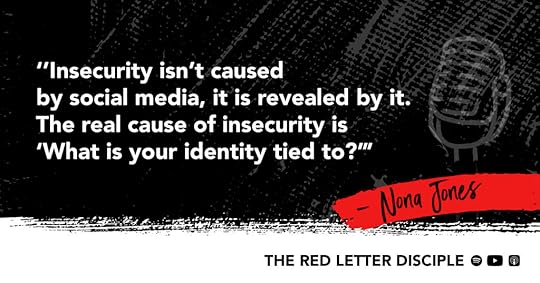
We get lost in the transactional nature of social media. – Nona Jones
Social technology gives us access to sides of people we don’t normally see. – Nona Jones
As believers, everything we post is an opportunity to bring others closer to Jesus. – Nona Jones
“It doesn’t matter how many followers you have if they are not following God too.” – Nona Jones
“Insecurity isn’t caused by social media, it is revealed by it. The real cause of insecurity is ‘What is your identity tied to?’” – Nona Jones
Physical appearance is an insecure foundation: 1) you will age and 2) standards change. – Nona Jones
The biblical character Jonathan proves to us that God’s favor on someone else’s life is not a threat to the purpose on our own. – Nona Jones
Humility is fully occupying your lane of life. – Nona Jones
Where insecurity sees someone as a competitor, humility sees someone to celebrate. – Nona Jones
Nona Jones’s Challenge: Think about who is the person who triggered your insecurity. Reach out to that person, encourage them, and pray for them.
Are you following Jesus?
Many want to be greater followers of Jesus but don’t know how. So we did an extensive study on everything that Jesus commanded of us and located key targets. The five targets are Being, Forgiving, Serving, Giving, and Going.

In partnership with LifeWay Research, we created the FREE Red Letter Challenge Assessment that will measure you according to these five targets. You will get results back immediately and be presented with practical steps and challenges to help you become an even greater follower of Jesus.
You can take the FREE Red Letter Challenge Assessment here.
Watch the entire season for free:We’ll be uploading every episode of season two of The Red Letter Disciple on our YouTube Channel. If you aren’t subscribed already, you can do so here!
The post 019: Nona Jones Discusses Her Battle with Insecurity and Why She is Killing Comparison appeared first on Red Letter Living.
September 19, 2022
018: Tony Morgan from Unstuck Group, On Good and Bad Trends in the Church Right Now
There is no better time for Tony Morgan’s The Unstuck Group ministry than now. He believes that healthy churches are often stuck in a hard season. His advice for balancing discipleship and evangelism is relevant to every church and every disciple; just walk across the street.
As an author, podcaster, blogger, communicator, or content creator, do you ever feel like you put in the same amount of effort as others, but don’t see the same results? Carey Nieuwhof and The Art of Leadership Academy have a free mastermind that will help you amplify your reach and impact online by:
Identifying your dream audienceLearning how to get them to notice you and connect with you; and Figuring out which platforms are worth your time and effort and which aren’tTo register for free, visit influencekickstarter.com. Building online influence doesn’t have to be intimidating or complicated. And it also doesn’t have to be gimmicky or ruin your integrity.

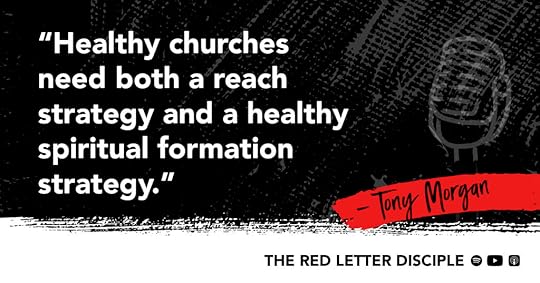
In most cases, it’s not that churches are unhealthy; they are healthy churches that are just stuck. – Tony Morgan
In-person attendance still seems to be a good barometer for engagement in many other areas of a church’s ministry. – Tony Morgan
For those that only engage online, are we actually going to be their church in a moment of crisis? – Tony Morgan
Is your online service going to be your front door or just another door? – Zach Zehnder
Traditional church pastors are starting to act like church planters. – Tony Morgan
Healthy churches need both a reach strategy and a healthy spiritual formation strategy. – Tony Morgan
A reach strategy should be a part of the life of every person who calls themselves a Christ follower. – Tony Morgan
Because of social media, we have more relationship connections than ever, but we don’t know how to do relationships. – Tony Morgan
When there’s an interruption, we lean in. –Tony Morgan
Rather than going across the globe, the biggest challenge I have is going across the street. – Tony Morgan
Tony Morgan’s Challenge: Be intentional about engaging with someone who you know but don’t really know.
Lead yourself (and your church) to be more like Jesus.

For so many Christians, the discipleship process isn’t very clear.
They know they need to go to church, pray, not sin, and maybe attend a small group. While these are great things, they don’t outline a clear path leading people to live more like Jesus.
We’d love to introduce you to the 40-Day Red Letter Challenge.
When you and your church take the challenge, you’ll have a clear 40-day discipleship path that will help you master five key areas of discipleship.
You can learn more about the challenge here!

We’ll be uploading every episode of season two of The Red Letter Disciple on our YouTube Channel. If you aren’t subscribed already, you can do so here!
The post 018: Tony Morgan from Unstuck Group, On Good and Bad Trends in the Church Right Now appeared first on Red Letter Living.
September 15, 2022
7 Tips to Help You Plan Your 2023 Preaching Calendar
Can you believe it? It’s that time of year already! So many churches are already looking ahead and planning out their 2023 sermon calendar. As pastors, we understand how vital the sermon is to the overall growth and health of the church.
In fact, at the end of 2016, Pew Research completed a study that determined the top reasons why people chose a particular church. Coming in at number one, chosen by 83%, was the quality of sermons. If sermons are that important, we need to ensure that we are giving it our best and choosing relevant sermon topics.
Here are seven tips to help you plan your preaching calendar for 2023:
Plan the Whole Year Out, But do it in Pencil.
While it’s essential to get ahead and plan, 2020 showed us that we must hold all of our planning with open hands. Proverbs 16:9 confirms this point for us: The heart of man plans his way, but the Lord establishes his steps.
The events of 2020 caused pastors to pivot to address the pandemic, racism, and the Fall election. Like many things in 2020, our sermon calendars were thrown out the window to be relevant to what was happening. In the wake of the pandemic and the events of 2020, a shift has happened now in 2021 and 2022. Many churches have jumped on board and pivoted to add sermons or a series discussing mental health.
So, as you plan the calendar, it is wise to have the complete perspective of 2023 in mind but the flexibility in our schedules to address the real-world issues that may come.
Identify the Needs of Your People.
When planning which topics or themes are relevant, we should look no further than what our people are searching for amid these turbulent times. At the center of our job as pastors should be shepherding and leading our people. Acts 20:28 tells us: Pay careful attention to yourselves and to all the flock, in which the Holy Spirit has made you overseers, to care for the church of God, which he obtained with his own blood.
In December, YouVersion Bible App will allow us to see what Bible topics and passages were the most searched for, read, and highlighted in a year. You can see past years here: 2021 and Not only can we see this in December, but thanks to YouVersion for Churches, did you know that you can register as a church and that the people who attend your church can select your church? After they do this, you can get a summary of what your people are reading, searching for, sharing, and highlighting! How amazing is that? And, it’s FREE!
Not only can this help with sermon planning, but it can also give you a real-time update on the needs or interests of your congregation.
One 4-6-week sermon series our church has done (borrowed initially from “Church of the Highlands”) in the past is called “You Asked for It.” We develop a series of about 20-25 questions that we feel our people are asking us. We then survey our congregation and have them vote on which questions they would like us to preach. Not only are we ensuring that we give relevant sermons, but it also allows us to have our people engage with us. We typically have done this sermon series in some of our higher attendance seasons, following Easter or to begin the Fall “Back to School” season.
Interestingly, this data also gives us which questions are the least requested. Nearly every year, questions about sexual brokenness are found at the bottom. This shows me that some of the questions that are least asked may be things we don’t want to discuss but need to discuss.
Share what God is Placing on Your Heart.
What a privilege it is to be the mouthpiece of God in this world! When we preach God’s Word, we have His assurances that it will never return empty. Effective preaching comes out of the overflow of our hearts. Matthew 12:34 declares: For the mouth speaks what the heart is full of.
As we dive into our personal devotions and Scripture readings, pay careful attention to those passages or topics that God stirs in your heart. Usually, in a calendar year, I’ll have 2-3 significant ideas that God continues to put firmly into my heart. So leave room in the calendar for these moments, whether a single standalone sermon or a complete series. When we speak from our heart, knowing that God’s Spirit is already at work within His Word going out, it creates opportunities for God to move mightily.
Preach the Core Values of Your Church.
Likely your church has core values that are important to accomplishing your mission and vision. It is wise to revisit these core values yearly in a message. It could even be an entire series of messages on each core value. For vision to stick, it must continue to be reinforced over and over and over again. Nothing will help get to your vision more than reinforcing the values that it will take to get to the vision. Andy Stanley says, “Vision doesn’t stick without constant care and attention.”
The wise King Solomon once said in Proverbs 29:18: “Where there is no vision, the people are unrestrained.” So a great way to help your vision stick is to preach through your values and teach how these values help accomplish your church’s vision.
If preaching your core values seems redundant or undesirable for you, I would challenge you to develop greater core values for your church. Preaching the core values of your church should never get old!
Utilize the Strengths of Your Preaching Team.
God has wired each person differently. I genuinely believe that none of us can be experts in everything, but we are and likely should be experts in a few things. Romans 12:6 reminds us: “Having gifts that differ according to the grace given to us, let us use them.”
If you are blessed to have a preaching team, play to the strengths of your preaching team. Each person on your preaching team has different gifts. If you have someone on your team who is gifted or trained in certain areas, let that pastor preach on what they are gifted at. For instance, my sweet spot is discipleship. Another person on our team is gifted in counseling. Yet another is gifted in leadership. When we each play to our strengths, the congregation experiences the win.
Preaching our strengths should not only come in topics but also regarding style.
Each sermon ought to be based on God’s Word. But how you bring in God’s Word could vary. You may be more on the expository (verse-by-verse) side, or you may thrive by telling stories and illustrations using the Bible as your anchor text. Whatever it may be, play to your strengths.
Plan At Least One All-In Church Series or Challenge per Year.
I’m amazed at the energy that an all-in church series can bring. Using materials or resources that can tie the whole church in for the entire week (not just on Sundays) is crucial. So many of our churches have become split into an in-person, digital, and hybrid model. Finding resources that tie us together during the week and on the weekend is paramount. It is not only the church of the future; it’s the church of right now.
For the last five years, even before the pandemic, I have had hundreds of conversations with other pastors who intentionally put one or two all-in church series in their calendars yearly. These all-in series bring unity to the church and increase weekly engagement in small groups and online. Not only this but for church leadership, having an all-in series that’s already been written or prepared allows the leadership of the church to use materials where you do not have to start from scratch. I have found it wise to put a couple of times in the year that gives the staff some breathing room.
Our team at Red Letter Living has had the privilege to work with more than 800 churches for an all-in-church challenge. So, if you are looking for a resource that can tie into your preaching calendar, we’d love to work with you on one of our 40-day challenges: Red Letter Challenge, Being Challenge, or Forgiving Challenge. And did you hear the news? Serving Challenge will be coming out in the Fall of 2023. So, jump in and join the waitlist to launch in October 2023. And, if you are wondering when is the most strategic time to launch a 40-day challenge or all-in series, find out here.
Stretch Yourself by Preaching Something New.
Earlier I mentioned playing to your strengths and preaching on topics that you excel in. It is also wise to stretch yourself yearly with a series or two of messages on things you’ve never preached. We are continual learners, and God gives us new insight as we dive into fresh waters. The entirety of Scripture is essential, as Paul reminds Timothy in 2 Timothy 3:16-17: All Scripture is breathed out by God and profitable for teaching, for reproof, for correction, and for training in righteousness, that the man of God may be complete, equipped for every good work.
Those are seven quick tips to help you plan your 2023 preaching calendar. Are there any other tips that you would add? What sermon series are you planning to preach this year?
The post 7 Tips to Help You Plan Your 2023 Preaching Calendar appeared first on Red Letter Living.
September 12, 2022
017: Myron Pierce on What Disciples can Learn from Gang Culture
Myron Pierce opens up his story and how he went from a troubled teenager with a 200-year prison sentence to becoming a leader of leaders, an entrepreneur, a pastor, a father, a husband, an author, and so much more!
Today’s episode is brought to you by Red Letter Living. Pastors and church leaders, we create 40-day challenges that have helped more than 800 churches produce greater disciples. Not only this, but our resources grow small groups by more than 40%. If you are a pastor or church leader, not only can you find out more at this link, but you can also request a FREE 40-day challenge mailed to your door there.
As you plan for the end of this Fall or even the start of the New Year, we’d love to partner with you and we have some amazing deals with our ready-to-go church packs. But, first, get a FREE copy on us.
Resources mentioned in the episode:Digital Ministry: Pastoring In a Pandemic by Myron Pierce
The Entrepreneurial Learning Initiative
Key insights from the episode:
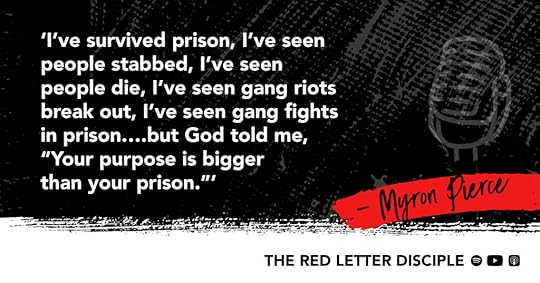
Myron, a man who once had a 200 year sentence, is now speaking to 200 prisons.
In order for Paul to write “I can do all things through him who strengthens me”, he had to experience something to validate that conclusion. – Myron Pierce
I’ve survived prison, I’ve seen people stabbed, iv’e seen people die, i’ve seen gang riots break out, I’ve seen gang fights in prison….but God told me, “Your purpose is bigger than your prison.” – Myron Pierce
Gangs taught me how to disciple people. – Myron Pierce
Sometimes I don’t need to open my mouth for evangelism. I just need to actually do the work so that people can open their mouth for me. – Myron Pierce
The largest missional and entrepreneurial incubator on the planet is the local church. – Myron Pierce
“It used to be ‘Give a man to fish, feed him for a day. Teach him how to fish, feed him for life.’ We say, “Own the pond!” – Myron Pierce
“What if we made 10% of North Omaha’s inner city population, 7,000 people, into entrepreneurs?”- Myron Pierce
Myron Pierce’s Challenge: Evaluate yourself: how much time are you spending making disciples? Use Myron’s HOPE method.
Lead yourself (and your church) to be more like Jesus.

For so many Christians, the discipleship process isn’t very clear.
They know they need to go to church, pray, not sin, and maybe attend a small group. While these are great things, they don’t outline a clear path leading people to live more like Jesus.
We’d love to introduce you to the 40-Day Red Letter Challenge.
When you and your church take the challenge, you’ll have a clear 40-day discipleship path that will help you master five key areas of discipleship.
You can learn more about the challenge here!

Prison is like a Wal-Mart that you can’t get out of. – Chris Johnson
We are going to blow the hinges off of hell! – Myron Pierce
Watch the entire season for free:We’ll be uploading every episode of season two of The Red Letter Disciple on our YouTube Channel. If you aren’t subscribed already, you can do so here!
The post 017: Myron Pierce on What Disciples can Learn from Gang Culture appeared first on Red Letter Living.
September 5, 2022
016: Jeff Kloha, Chief Curatorial Officer of The Museum of the Bible
Chief Curatorial Officer of the Museum of the Bible in Washington D.C., Dr. Jeff Kloha, gives us a glimpse into the wonderful world of the museum, his opinions on YouVersion Bible App, and why he is optimistic about people’s Bible reading habits.
As an author, podcaster, blogger, communicator, or content creator, do you ever feel like you put in the same amount of effort as others, but don’t see the same results? Carey Nieuwhof and The Art of Leadership Academy have a free mastermind that will help you amplify your reach and impact online by:
Identifying your dream audienceLearning how to get them to notice you and connect with you; and Figuring out which platforms are worth your time and effort and which aren’tTo register for free, visit influencekickstarter.com. Building online influence doesn’t have to be intimidating or complicated. And it also doesn’t have to be gimmicky or ruin your integrity.
Resources mentioned in the episode:The Samaritans: A Biblical People Exhibit
Key insights from the episode: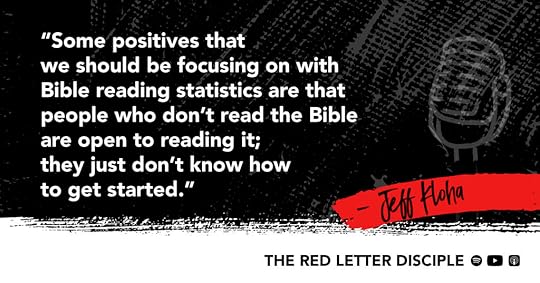
When people hear the word ‘museum,’ most of them think “boring, dusty, old.” When people hear the word ‘Bible,’ what do they think? “Boring, dusty, old”….so what could possibly be more boring than The Museum of the Bible? It’s like “boring squared.” The goal was to create a space to showcase the Bible in an engaging way. – Jeff Kloha
Some positives that we should be focusing on with Bible reading statistics are that people who don’t read the Bible are open to reading it; they just don’t know how to get started. – Jeff Kloha
YouVersion’s findings indicate that more people are engaging during the week: Monday through Saturday than they were pre-COVID. – Jeff Kloha
Let’s be creative in how we are bringing God’s Word to people. – Jeff Kloha
The key to all this, and it’s always been this way, it’s up to us as individual people to come alongside, to find out where people are at, and to help them find their way into the Bible. – Jeff Kloha
It has always been the people of God bringing the Word of God to others. – Jeff Kloha
What really was the draw [to the job of chief curatorial officer] was to try to do something different. – Jeff Kloha
Beginner readers of the Bible need to go to the Psalms. – Jeff Kloha
The phrase “kingdom of God” occurs 105 times in the gospels. – Jeff Kloha
A non-negotiable is to love your neighbor. – Jeff Kloha
Dr. Jeff Kloha’s Challenge: Pick up the Bible and read for seven days in a row.
Dr. Kloha has given his life to help people understand God through the Bible. Did you know that studying Scripture is one of the 5 Keystone habits of Jesus? That’s right. If you want to go deeper into leading yourself (and your church) to building the habits of Jesus, we’d love to introduce you to the 40-Day Being Challenge.

Many Christians today aren’t great at maintaining the habits of Jesus.
Even the most “mature” Christians struggle with opening up in community, prioritizing prayer, and seeking regular solitude. But that doesn’t have to be your story.
The Being Challenge guides you through 40 days of practical, simple-to-understand challenges to help you learn, develop, and grow in the five keystone habits of Jesus.
You can learn more about the challenge here!

What could possibly be more boring than The Museum of the Bible? It’s like “boring squared.”
Being a chief curatorial officer does not mean Dr. Kloha goes around with a cowboy hat and bullwhip and collects artifacts.
Professor Kloha’s favorite classes to teach were the ones Zach and Chris were NOT in! (Just kidding!)
One of Dr. Jeff Kloha’s goals is to be less snarky than he was when he was a professor. As soon as he sees Zach and Chris, it all kicks back in.
Dr. Jeff Kloha threatened to give Zach and Chris a Greek quiz after the interview!
Watch the entire season for free:We’ll be uploading every episode of season two of The Red Letter Disciple on our YouTube Channel. If you aren’t subscribed already, you can do so here!
The post 016: Jeff Kloha, Chief Curatorial Officer of The Museum of the Bible appeared first on Red Letter Living.
September 1, 2022
3-Step FREE Masterclass to Crush Anxiety and Restore Mental Health
Oh, to be in the mind of a toddler! I remember when Brady, our youngest son, was 18 months old and enjoying some time playing outside. At that stage of life, a child wants to have fun, no matter what the cost.
On this particular day, Brady played outside in our backyard while Allison and I were on the back porch. It got quiet for a long time, which is always dangerous for parents, right? Parents crave a few quiet moments, but when our kids are actually silent, we think they are probably up to something! It turns out he was. Brady came up, and we noticed red spots all over his legs. After investigating what happened, Brady showed us the fire ant hill he had been playing on. I guess he was desperate to play with friends, and these devilish little creatures became his playmates that day. Brady endured more than 50 fire ant bites in the name of fun. Just as Brady was physically playing with a hill of ants that day, I wonder how many of us mentally willingly play on anthills?
In the book What Most Parents Aren’t Telling You, the number one thing parents most want for their kids is mental health.[i] While there is some debate in the medical field, many experts believe that much of mental health stems from the brain. Eric Kandel, a Nobel Prize laureate and professor of brain science at Columbia University, says, “All mental processes are brain processes, and therefore all disorders of mental functioning are biological diseases. The brain is the organ of the mind. Where else could mental illness be if not in the brain.” [ii]
I wonder if parents are so worried about their children’s mental health because they are also concerned about their own mental health. I pose this because I know how easy it is for me to project my biggest fears onto my children.
So, what’s happening in your brain? What’s going on in your mind? As we look at the research, it’s easy to see why mental health, anxiety, and worry are skyrocketing in today’s world. According to the National Science Foundation, the average person has between 12,000 to 60,000 thoughts every single day! Of those thoughts, 80% are negative, and 95% are repetitive thoughts[iii]. Cognitive Behavioral Therapists describe those negative thoughts as ANTs (Automatic Negative Thoughts).
Our thoughts are a collection of broken records that we replay over and over and over again. And, if that were the end, it’d be depressing. But it’s not the end. You can not only change your mind, and you can change your life.
The key to a changed life is a changed mind.
No, this isn’t some Oprah, New-Age, name it and claim it kind of philosophy I’m pointing you to. Instead, it’s the opportunity to think new thoughts. And it’s pretty scientific and also quite biblical. I love it when science and the Bible line up. I agree with DawnChere Wilkerson, who says, “Real science is just the discovery of God’s wisdom.” [iv]
Science tells us that our brains feature neuroplasticity. Essentially, while it is natural for our brains to go down a particular pathway, our brains can change, adapt, and create new pathways. This research proves it is possible to change our thoughts. But, it requires some work. And as our thoughts can change, this can lead to a changed or transformed life. Romans 12:2a says, “Do not conform to the pattern of this world, but be transformed by the renewing of your mind.”
But how do we renew our minds to be more like Christ? The apostle Paul gives us the 3-step masterclass in Philippians 4:6-9. As we look closely at those Bible verses, we see a 3-step process emerge to help us change our minds.
Do not be anxious about anything, but in every situation, by prayer and petition, with thanksgiving, present your requests to God. And the peace of God, which transcends all understanding, will guard your hearts and your minds in Christ Jesus.
Remove the ANTs (Automatic Negative Thoughts)
First, Paul says we don’t have to hang onto our negative thoughts or anxiety. Not every idea that comes into your head is worthwhile. Not every thought that comes into your head is true. The devil is known as the father of lies. That is his native tongue. And so, while his strategy is simple, his approaches are dynamic.
I don’t think his initial first step is to make you believe that God isn’t authentic or that the Bible isn’t true. Eventually, he will want to take you there. Still, he usually starts by forcing you to look at your outside set of circumstances and wanting to bring doubt into your minds.
But, you don’t have to fixate on every thought. Instead, you can give over every negative thought to God. We do this through prayer, by having a conversation with God. Because God desires to be in a relationship with you, you can test every thought. He’ll never get tired of listening to you and spending time with you. And, even more, He understands what you are going through. Remember that Jesus walked this planet and endured every temptation known to humanity. He can sympathize with whatever situation you are going through. So, every negative thought we can give to Jesus. “Cast all your anxiety on Him because He cares for you.” 1 Peter 5:7
Paul then moves to the second step in the masterclass.
Finally, brothers and sisters, whatever is true, whatever is noble, whatever is right, whatever is pure, whatever is lovely, whatever is admirable—if anything is excellent or praiseworthy—think about such things.
Replace with positive thoughts
It’s not enough to just remove negative thoughts. If you don’t fill your mind with positive thoughts, left to your natural state, you’ll find more negative stuff to fill it.
We have to think godly thoughts intentionally. The apostle Paul tells us in Colossians 3:2, “Set your minds on things above, not on earthly things.” What are those things above? He gives a pretty great list right here. He urges us to think true, noble, right, pure, lovely, admirable, excellent, and praiseworthy thoughts.
What a great exercise! Anytime you experience a negative thought, take it through this list.
What is true about this thought? You might recognize, by the way, with this first question, that there is nothing true about this thought, and it is a lie. So at that point, you can let go of that thought completely.
Then, keep going through that filter.
What is noble? The Greek word here is “venerable” and implies tremendous respect, primarily because of age. So, think about that. It’s time-tested and proven. Is your thought noble? Is it time-tested and proven?
Keep going through the list: what is right, pure, lovely, admirable, excellent, and praiseworthy?
What will end up happening is you will end up flipping a lot of the negative thoughts into positive, truthful statements that can become declarations. Here are a few examples:
I’m not attractive to I’m grateful that I’m healthy, have eyes to see, ears to hear, and lungs that give me breath.I’ll never make it to I can take one step forward today.I can’t beat this addiction to God has put His power inside of me. If God is for me, who can be against me?Nobody knows me to God knows my name, has written my name in the book of life and orchestrates all things for my good.
Let’s return for the final step in the masterclass:
Whatever you have learned or received or heard from me, or seen in me—put it into practice. And the God of peace will be with you.
Repeat the practice
Paul says, “Put it into practice.” This process is not a one-time event. The world is coming at all of us very fast, which is why we must learn this process and repeat it multiple times a day. Again, if we think between 12000 to 60000 thoughts daily, there are ample opportunities to renew our minds.
Paul says that at the end of this process, we get the opposite of anxiety: we will have God’s peace. And God’s peace will transcend human understanding. I love the word transcend. It means to go above, beyond, or surpass. So, no matter what comes at us from this world, God’s peace prevails when we put this process into practice. It wins the day. God’s peace is what the world, you, and I need more of.
When you practice these three steps, not only will you destroy anxiety and be filled with peace from above, but you will also represent God’s peace in a world that desperately needs it.
Watch the sermon video to see how the apostle Paul, who wrote this masterclass for us, did this in his life. Check out the sermon here.
Challenge for the Day:
Today, we are going to put into practice the 3-step process that Paul lays out:
Remove: What are the negative thoughts that you are feeling today? List them out and pray that God would remove them.Replace: Think positive thoughts. List one thing that you think about for each of the words Paul gives us in Philippians 4:8:TrueNobleRightPureLovelyAdmirableExcellentPraiseworthyRepeat: After completing this exercise once, attempt to do this exercise every time a negative thought triggers you.
[i] What Parents Most Want, Page 25. Kindle.
[ii] https://www.apa.org/monitor/2012/06/roots
[iv] https://www.youtube.com/watch?v=nP4GylMnRFc&ab_channel=VOUSChurch
The post 3-Step FREE Masterclass to Crush Anxiety and Restore Mental Health appeared first on Red Letter Living.
August 30, 2022
015 Pastor Mark Schulz on His Ministry to the LGBTQ community
Pastor Mark Schulz may be retired, but he’s not tired! He shares what retirement has been like for him so far and why he believes God is calling him to minster to the LGBTQ community. Pastor Schulz also addresses how to avoid placing too much identity in your career, and last but not least, where to get the best pizza in Chicago!
Every pastor knows small groups are important, yet a lot aren’t too happy with where their small groups are right now. You can grow your small groups right now. That’s right. We have helped more than 800 churches grow their small groups, and it’s not as hard as you think. Our super-simple, easily-doable 5-step guide to grow your small group strategy is found by clicking on this link.
Resources mentioned in the episode:Robert Colb – The Christian Faith
Key insights from the episode: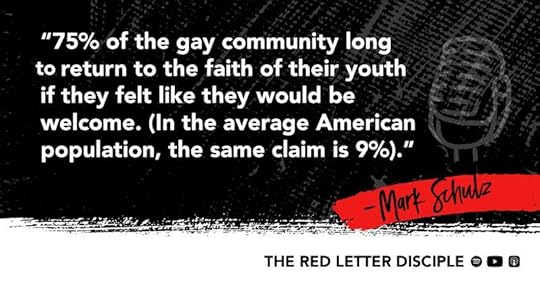
You can’t run away from God; eventually, He gets you where He wants you to be. – Mark Schulz
Don’t sweat the big stuff all the time. – Mark Schulz
When you show up in the little things, God works in big ways. – Zach Zehnder
I wasn’t ready for the “Now what do I do?” piece of retirement. – Mark Schulz
I’m one who believes that what you want to do and what you should be doing ought to be pretty meshed in your life. – Mark Schulz
How do I stay faithful to what God’s Word has to say and yet lead with love and grace, which is what I believe God wants us to do? – Mark Schulz
The good first right question to ask is not “Is being gay a sin?”; the good first question to ask is “Where is your source of identity?” – Mark Schulz
86% of the LGBT community grew up in a faith-based community. – Mark Schulz
75% of the gay community long to return to the faith of their youth if they felt like they would be welcome. (In the average American population, the same claim is 9%). – Mark Schulz
The first thing we need to do is listen more and talk less. – Mark Schulz
Mark Schulz’s Challenge: Have one spiritual conversation with someone this week.
Lead yourself (and your church) to find freedom in forgiveness.

As Mark was talking in this interview, it showed me how much collective work we have to when it comes to forgiveness.
We’d love to help you and your church discover what freedom in forgiveness feels like by exploring the powerful forgiveness that Jesus offers to each and every one of us.
We’d love to introduce you to the 40-Day Forgiving Challenge.
The Forgiving Challenge takes you on a life-changing journey to experience the gift of God’s grace so that you can share it with others. It also helps you identify and walk through the five phases leading to freedom.
You can learn more about the challenge here!
Some not-so-key insights:Luminati’s is the best pizza in Chicago, and if you’re going to get Chicago pizza, deep-dish is the way to go. – Mark Schulz
Write three wedding messages in seminary, and you never need to write another wedding message. – Chris Johnson
Maybe we ought to start serving mimosas and egg sandwiches at church. – Chris Johnson
Watch the entire season for free:We’ll be uploading every episode of season two of The Red Letter Disciple on our YouTube Channel. If you aren’t subscribed already, you can do so here!
The post 015 Pastor Mark Schulz on His Ministry to the LGBTQ community appeared first on Red Letter Living.
August 24, 2022
Do You want to be a Greater follower of Jesus? Join the Red Letter Community!
We are excited to announce the Red Letter Community! This is a community of people that commit to becoming greater followers of Jesus.
Are you in?
This blog will answer three questions:
Why does the Red Letter Community exist? How did the Red Letter Community come about? What does the Red Letter Community look like?Why does the Red Letter Community exist?
We have discipleship problems.
Chief among them is that nearly every Christian understands how important it is to be a disciple but has very different definitions. So, let me clear it up.
A disciple is a follower of Jesus. Nothing more, nothing less.
Many Christians know we are supposed to follow Jesus, but we aren’t sure practically how that looks today. Crazily, we live in a day where we have more discipleship information than ever. Yet, I would argue more confusion than ever.
Disciples need clear targets.
As Christians, we can have the best intentions, but if we succeed at things that don’t actually matter, we can do more harm than good. D.L. Moody once said, “Our greatest fear shouldn’t be of failure but of succeeding at something that doesn’t matter.” So I’ll go a step further and say my greatest fear is that Christians succeed at something that actually pushes people away from Jesus.
It’s fine to have good intentions. But, in our good intentions, somehow, we’ve missed the targets that Jesus is most known for. Jesus is known for love, grace, good works, kindness, and unity. But, sadly, Christians, from the book UnChristian, are known for judgment, hypocrisy, division, and being out of touch.
If Jesus is known for grace, which is getting a free gift you don’t deserve, and we are known for judgment, getting what you do deserve, we have miserably failed. By definition, judgment and grace are opposites. We have missed the mark. If Jesus is known for unity and we are known for division, we’ve missed the mark. If Jesus is known for His good works and we are known for our hypocrisy, we’ve missed the mark.
We haven’t just missed the mark a little bit. Instead, we’ve become known as the exact opposite of the One we are called to embody.
Intention to follow Jesus without precision on Jesus leads to confusion.
It’s time to shoot at the correct targets. If our intent is to follow Jesus, let’s take precise aim at Jesus. Why would we look to anyone other than Jesus for how to be a disciple? It’s not like we have to guess what a disciple looks like. God sent His Son Jesus into this world to not only give His life for us, but He also showed us the path to follow Him as well.
Intention to follow Jesus with precision on Jesus leads to transformation.
About a decade ago, as I was planting a church, I had this longing to lead my church beyond its comfort zone. I noticed strengths in my core group. Loyalty, commitment, and generosity to support a church plant were chief among them. But, when it came to serving in the community or inviting a friend to go to church, I noticed pushback. So, I came up with this crazy idea. If they won’t listen to me, someone they certainly cared about but was new in their lives, might they listen to Jesus? So, here was the question I began pondering.
What if we take the words of Jesus and actually put them into practice
Literally.
Before you start giving me too much credit for my idea, I must admit that I stole the idea from Jesus Himself. Jesus provides us with the key to following Him at the end of the Sermon on the Mount.
“Therefore, everyone who hears these words of mine and puts them into practice is like a wise man who built his house on the rock. The rain came down, the streams rose, and the winds blew and beat against that house; yet it did not fall, because it had its foundation on the rock. But everyone who hears these words of mine and does not put them into practice is like a foolish man who built his house on sand. The rain came down, the streams rose, and the winds blew and beat against that house, and it fell with a great crash.” Matthew 7:24-27
If you have read the Sermon on the Mount, you know it’s rather difficult to understand. Jesus uses humor and sarcasm and introduces counter-cultural ideas. It amazed all who were in attendance. It still amazes us today.
But what stuck out to me is that He closes this sermon with an illustration so simple that it reminds me of the children’s story “The Three Little Pigs.”
Jesus says, “If you want your house to stand up and not blow over when the winds, storm, or bad, evil wolf comes, practice what I’m preaching. Do what I say.” Jesus says in Luke 11:28: “Blessed rather are those who hear the word of God and obey it.” James, the brother of Jesus, says it even more simply in James 1:22: “Do not merely listen to the word, and so deceive yourselves. Do what it says.”
That’s the big idea.
The best way to follow Jesus is simply to follow Jesus!
To change the picture we are giving of Jesus, we will look to Jesus. We will take Jesus’ words, written in red letters in your Bibles, and put them into practice. We will look at His life and do our very best to embody Him in this world. That’s the very unoriginal yet revolutionary idea that will change not just the followers of Jesus but the world in which we live!
So, will you join us on this journey?
How did the Red Letter Community come about?
Over 7 years, from 2011-to 2018, I captured many of the above thoughts and put them into a 40-day challenge book called Red Letter Challenge. Once I finished writing the book, I intended to continue to be a lead pastor. I had no intention of doing anything else.
That’s when something crazy happened!
Hundreds of thousands of people were introduced to Red Letter Challenge. Many talked about how life-changing this 40-day journey was. My wife Allison’s heart began stirring towards offering a kid’s version. She believed (and I agree) that kids not just can be disciples, but they are disciples. So she went to work writing Red Letter Challenge Kids, and it was published in 2019.
More and more pastors continued to encourage us to write more books, specifically practical books centered on how to follow Jesus.
After hearing from enough of them, Allison and I made a tough decision through many conversations with each other, with others, and especially with God.
At 36 years old, in the summer of 2020, in the middle of leading an extremely fast-growing church, I would step down as the full-time lead pastor and move into a part-time role. This enabled us the time, energy, and resources to continue to develop more resources that challenge people to become greater disciples of Jesus.
This is my life’s call. In fact, it’s my personal mission statement: I exist to challenge people to become greater disciples of Jesus.
Fast-forward a couple of years, and we have gone from one series (Red Letter Challenge) to multiple series (Being Challenge and Forgiving Challenge). Did I mention we are writing the newest 40-day series Serving Challenge right now? Not only this, but we have developed loads of FREE resources for small groups, FREE YouVersion Bible Reading Plans, FREE ebooks, and a FREE Red Letter Challenge Assessment (a tool that has been completed over 4000 times).
In addition, we have regularly been blogging and have even launched a discipleship podcast. On top of this, we are continuing to create more resources this year that will help, and we are beginning to issue weekly challenges to continue to take steps of faith toward Jesus!
What started as a tremendous 40-day experience, through a book we hope launches into a lifetime of truly following Jesus.
And that’s why we are forming the Red Letter Community.
What does the Red Letter Community look like?
For now, it’s a totally online community, and it’s done primarily through email. If you get our emails you are in already! If you enjoy our emails will you share them with a friend and invite them to join you in this community? This community is where you will receive all of the latest and most significant resources to help you become a greater follower of Jesus!
In your email inbox, you can expect to receive your weekly discipleship challenge each week. In addition, you’ll get alerted to the brand-new podcasts featuring world-class disciples. You’ll also see Jesus-centered blogs to help you grow in your faith.
Not to mention, we’ll keep you updated on our newest projects, send you loads of FREE resources along the way, and give you some sweet discounts you’ll find nowhere else!
To get in, just visit this link, and share your email address with us.
We believe this is just the start of something that will be very BIG. We have a vision for how this community can grow in the future, but for now, jump in, let’s follow Jesus together, and let’s give the world the fullest and greatest expression of Jesus possible!
The post Do You want to be a Greater follower of Jesus? Join the Red Letter Community! appeared first on Red Letter Living.
August 23, 2022
014: Todd Doxzon Breaks Down His Journey From the NFL to Church Planting
Todd Doxzon was an NFL player living from himself until a mentoring relationship with Kurt Warner, a number of trades, and a series of injuries took him out of the game forever. He refocused his life on following Christ after reading the entire Bible in a year. Doxzon planted Love Church in Omaha, NE, and is committed to sharing God’s best with others.
The gap between how quickly you change and how quickly things change is called irrelevance. The Art of Leading Change course, taught by leadership expect Carey Nieuwhof, is a step-by-step guide to navigating the right changes and implementing them successfully. In the program, you get the entire playbook for leading change—from start to finish—including what changes are worth the risk, when to make changes, how quickly to make them, and how to communicate change. Plus, learn how to do this while minimizing the opposition and pushback. Until August 31st, you can sign up for The Art of Leading Change at it’s introductory price by visiting theartofleadingchange.com.

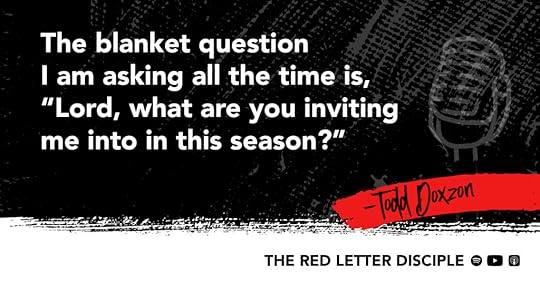
You can be a competitor and still love Jesus. I never knew! I always thought those were two mutually exclusive ideas. – Todd Doxzon
I found when I would excel athletically and would get attention, affirmation, and acceptance, my identity began to be based on performance. On one hand, it’s good because it creates a crazy drive to succeed; on the other hand, what happens when that goes away? – Todd Doxzon
There’s a lot of people out there who are saying, “I’m gonna show you, Dad,” “I’m gonna show you, girlfriend,” so it’s power, but tragically, if it’s not converted into an identity of “I know who I am and I want to maximize what God’s given me,” then there are problems. It’s a mind shift. – Todd Doxon
If I’m fully convinced that I have all I need in Christ, then I’m not as needy for other people’s approval or to desire to be in the “in crowd” anymore. We built bridges and reached these athletes through relationships and serving. – Todd Doxzon
There were little ways where you would just serve. We lead with service and unconditional love, not judgment, and it built bridges. – Todd Doxzon
When I’d go to a new team, one of the first things I would do is open up my Bible. Not in a weird way, but I wanted early on for them to know who I was. – Todd Doxzon
The blanket question I am asking all the time is, “Lord, what are you inviting me into in this season?” – Todd Doxzon
Bring it real. Don’t be a phony, bring it real. – Todd Doxzon
Words that the church and disciples are not known for as much are the things the world needs: fulfillment, joy, and happiness. – Zach Zehnder
We need to redefine and help people to see that, yes, God wants something great for you! God’s happy! Heaven is a party! What about any of this says God doesn’t care about happiness? – Zach Zehnder
Todd Doxzon’s Challenge: RESET: Rest, Evaluate, Saturate, Elevate, and Transition. Find some time to RESET this week.
Todd talked a lot about your identity being shaped by God, and not the other way around. Did you know that we find our identity in our relationship with God. But how do you grow in your relationship with God? There was only one person who has ever existed in a perfect relationship with God, and His name was Jesus. Being Challenge introduces you to the habits that Jesus practiced, which are habits we are called to practice. The more we “Be” like Jesus, the more we will see our true identity. What are you waiting for? If you want to go deeper into leading yourself (and your church) to building the habits of Jesus, we’d love to introduce you to the 40-Day Being Challenge.
Lead yourself (and your church) to be more like Jesus.

Many Christians today aren’t great at maintaining the habits of Jesus.
Even the most “mature” Christians struggle with opening up in community, prioritizing prayer, and seeking regular solitude. But that doesn’t have to be your story.
The Being Challenge guides you through 40 days of practical, simple-to-understand challenges to help you learn, develop, and grow in the five keystone habits of Jesus.
You can learn more about the challenge here!

Todd Doxzon is the nicest Iowa State graduate Chris has ever met.
Alliteration and acronyms are Zach’s love languages outside of food.
Todd Doxzon’s best years were his first three years since he moved to Omaha, NE when he was four years old.
Watch the entire season for free:We’ll be uploading every episode of season two of The Red Letter Disciple on our YouTube Channel. If you aren’t subscribed already, you can do so here!
The post 014: Todd Doxzon Breaks Down His Journey From the NFL to Church Planting appeared first on Red Letter Living.
014 Todd Doxzon Breaks Down His Journey From the NFL to Church Planting
Todd Doxzon was an NFL player living from himself until a mentoring relationship with Kurt Warner, a number of trades, and a series of injuries took him out of the game forever. He refocused his life on following Christ after reading the entire Bible in a year. Doxzon planted Love Church in Omaha, NE, and is committed to sharing God’s best with others.
The gap between how quickly you change and how quickly things change is called irrelevance. The Art of Leading Change course, taught by leadership expect Carey Nieuwhof, is a step-by-step guide to navigating the right changes and implementing them successfully. In the program, you get the entire playbook for leading change—from start to finish—including what changes are worth the risk, when to make changes, how quickly to make them, and how to communicate change. Plus, learn how to do this while minimizing the opposition and pushback. Until August 31st, you can sign up for The Art of Leading Change at it’s introductory price by visiting theartofleadingchange.com.


You can be a competitor and still love Jesus. I never knew! I always thought those were two mutually exclusive ideas. – Todd Doxzon
I found when I would excel athletically and would get attention, affirmation, and acceptance, my identity began to be based on performance. On one hand, it’s good because it creates a crazy drive to succeed; on the other hand, what happens when that goes away? – Todd Doxzon
There’s a lot of people out there who are saying, “I’m gonna show you, Dad,” “I’m gonna show you, girlfriend,” so it’s power, but tragically, if it’s not converted into an identity of “I know who I am and I want to maximize what God’s given me,” then there are problems. It’s a mind shift. – Todd Doxon
If I’m fully convinced that I have all I need in Christ, then I’m not as needy for other people’s approval or to desire to be in the “in crowd” anymore. We built bridges and reached these athletes through relationships and serving. – Todd Doxzon
There were little ways where you would just serve. We lead with service and unconditional love, not judgment, and it built bridges. – Todd Doxzon
When I’d go to a new team, one of the first things I would do is open up my Bible. Not in a weird way, but I wanted early on for them to know who I was. – Todd Doxzon
The blanket question I am asking all the time is, “Lord, what are you inviting me into in this season?” – Todd Doxzon
Bring it real. Don’t be a phony, bring it real. – Todd Doxzon
Words that the church and disciples are not known for as much are the things the world needs: fulfillment, joy, and happiness. – Zach Zehnder
We need to redefine and help people to see that, yes, God wants something great for you! God’s happy! Heaven is a party! What about any of this says God doesn’t care about happiness? – Zach Zehnder
Todd Doxzon’s Challenge: RESET: Rest, Evaluate, Saturate, Elevate, and Transition. Find some time to RESET this week.
Todd talked a lot about your identity being shaped by God, and not the other way around. Did you know that we find our identity in our relationship with God. But how do you grow in your relationship with God? There was only one person who has ever existed in a perfect relationship with God, and His name was Jesus. Being Challenge introduces you to the habits that Jesus practiced, which are habits we are called to practice. The more we “Be” like Jesus, the more we will see our true identity. What are you waiting for? If you want to go deeper into leading yourself (and your church) to building the habits of Jesus, we’d love to introduce you to the 40-Day Being Challenge.
Lead yourself (and your church) to be more like Jesus.

Many Christians today aren’t great at maintaining the habits of Jesus.
Even the most “mature” Christians struggle with opening up in community, prioritizing prayer, and seeking regular solitude. But that doesn’t have to be your story.
The Being Challenge guides you through 40 days of practical, simple-to-understand challenges to help you learn, develop, and grow in the five keystone habits of Jesus.
You can learn more about the challenge here!

Todd Doxzon is the nicest Iowa State graduate Chris has ever met.
Alliteration and acronyms are Zach’s love languages outside of food.
Todd Doxzon’s best years were his first three years since he moved to Omaha, NE when he was four years old.
Watch the entire season for free:We’ll be uploading every episode of season one of The Red Letter Disciple on our YouTube Channel. If you aren’t subscribed already, you can do so here!
The post 014 Todd Doxzon Breaks Down His Journey From the NFL to Church Planting appeared first on Red Letter Living.







